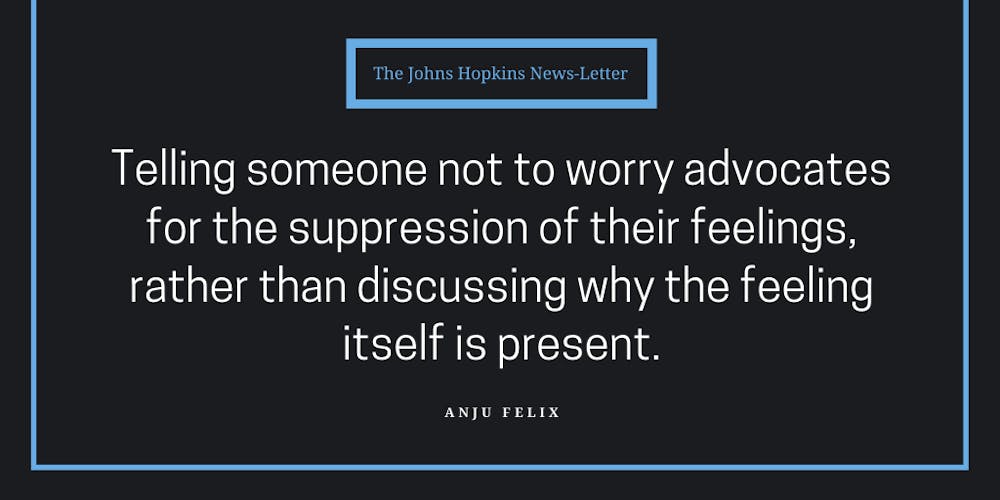Happiness is a relatively abstract feeling. Jussi Suikkanen, a scholar of philosophy and ethics, defines happiness as “the state we are in when we feel contentment, satisfaction, euphoria and the like.” With happiness, one is so content with their status quo that they no longer feel any need to change or move toward a different state.
Rather than happiness, we should strive for a positive mindset — a commitment to a lifestyle of improving oneself while maintaining a positive outlook. In other words, a positive mindset allows for change.
No one can feel happy all the time; in fact, it would be wrong to bathe in good feels and bury negativity. However as part of a generation constantly plugged in and connected to others, bombarded with “justgirlythings” gifs, I feel resentment. Maybe I’m just being overly pessimistic? Perhaps a plain and simple case of Debbie Downer disorder? Or indications of Negative Nelly malady?
On the contrary, these are the symptoms of being “normal” in its truest form. Sometimes we forget that happiness is not a permanent state of being we exist in. This forgetfulness is materialized by viewing the phenomenon of toxic positivity, the overgeneralized mandate calling for “good vibes” and “happy feels” that often result in the invalidation of genuine emotion.
On a microscale, toxic positivity can be exhibited in many forms, from words of affirmation to brushing off negative thoughts. Like trying to push a square peg into a round hole, individuals are pushed into this mold of positivity and disingenuousness. When the false front implodes, the vibe check is no longer passing. This results in failure to accept bad times and the replacement of feelings with the generic “live, laugh, love,” the commanding “just be happy” or maybe the ultimatum of “stop being so negative, it’s annoying.”
These nice-to-the-ear mantras can’t possibly be sustainable in the long term. Frankly, fostering a false sense of security rather than addressing the true feelings of an individual could do more harm than good. This toxicity is felt as a “meta emotion” — the disappointment one feels when their coping mechanism doesn’t yield as much happiness as it ought to. At the end of the day, it’s only short-lived encouragement, lacking the substance that true understanding and empathy could provide.
Fortunately we can combat toxic positivity. When a peer approaches you with a worry, rather than advising them to “stay positive,” offer a more validating response; perhaps ask them to describe their worries while maintaining an active listener role. Telling someone not to worry advocates for the suppression of their feelings rather than discussing why the feeling itself is present.
These small instances of suppressing our emotions habituate and become bigger than ourselves. Toxic positivity is not only the generalization of emotion. The concept can be extended to the approach of also attempting to suppress emotion, which is a key identifier of American culture. Reflect on the question “how are you?” The general reply is, “good,” “doing well” or “fine.” These are the reflexive answers we give when asked about our current state of being, even when they may not be true.
This social norm arose from adjacency pairing of the question and answer. It would seem strange if you responded to such a question with a truthful rapport. Spilling the tea on your genuine feelings would actually make someone else feel uncomfortable. We tend to generalize and/or minimize our own feelings in order to avoid speaking on or explaining any negativity. This points to general desensitization of emotions or at least a growing discomfort in discussing our genuine emotions when interacting interpersonally as well as intra-personally.
Our new normal: being stuck at home in light of a global pandemic, watching a fast-paced news cycle — all of it takes a toll. Census bureau data shows that a third of Americans show clinical signs of anxiety, depression or both — a huge leap from before the pandemic. In a survey conducted by The News-Letter, “81.8 percent of the students surveyed said that their mental health has been impacted, for better or for worse, since the start of quarantine.” Whether due to being uninformed of the University’s plans or undoubtedly the effects of isolation on the human psyche, we have all been affected.
Now more than ever, it’s important to reflect on your own bouts with toxic positivity and emotional desensitization and seek help. (Please be aware of all the resources provided by Hopkins, including mental telehealth services.) Keep in mind that it is totally fine not to be fine.
Anju Felix is a dual-degree sophomore studying Neuroscience, Behavioral Biology and Harp performance from Port Murray, N.J. She is a writer for the Triple Helix scientific journal.





